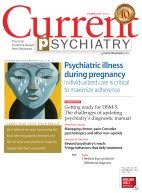Monday, June 1, 2009
Exercise prescription: A practical, effective therapy for depression
Kanwaldeep S. Sidhu, MD
Fourth-year resident, Department of psychiatry and behavioral neurosciences, Wayne State University, Detroit, MI
Pankhuree Vandana, MD
Third-year resident, Department of psychiatry and behavioral neurosciences, Wayne State University, Detroit, MI
Richard Balon, MD
Professor, Department of psychiatry and behavioral neurosciences, Wayne State University, Detroit, MI
Antidepressants alone do not adequately treat many patients with depression. In the STAR*D Project—which compared long-term outcomes of various depression treatments—only 28% to 33% of outpatients achieved remission with selective serotonin reuptake inhibitor (SSRI) monotherapy. Rates were somewhat higher with bupropion or serotonin norepinephrine reuptake inhibitor (SNRI) monotherapy, but greater benefit was obtained from augmenting SSRIs.
Combining antidepressants with psychotherapy and lifestyle changes—particularly exercise—makes sense intuitively and is supported by well-designed studies. This article examines the evidence supporting exercise for treating and preventing clinical depression. We begin by addressing clinicians’ concerns about motivating depressed patients to exercise.
Read full text (free access)
Listen to Kanwaldeep S. Sidhu, MD, offer advice on talking to patients about exercise
Comment on this article
Email the editor
Weight gain with antipsychotics: What role does leptin play?
Hua Jin, MD
Associate clinical professor, Department of psychiatry, University of California, San Diego VA San Diego Healthcare System, San Diego, CA
Jonathan M. Meyer, MD
Assistant professor, Department of psychiatry, University of California, San Diego VA San Diego Healthcare System, San Diego, CA
Clinical studies indicate that clozapine and olanzapine carry a high risk of treatment-related metabolic dysfunction—including weight gain, hyperlipidemia, and glucose intolerance—but certain patients with high metabolic liabilities who take atypical antipsychotics do not necessarily develop these adverse effects. Though the underlying mechanism for atypical antipsychotic-related weight gain is strongly associated with central histamine H1 antagonism and increased appetite, the pharmacologic basis for other metabolic changes is not fully understood and may involve weight-independent mechanisms.
One potentially relevant research area is peptide hormones’ impact on the regulation of food intake, body weight, and other metabolic parameters. As research has elucidated the properties of 1 of these hormones—leptin—investigators have started to examine possible correlations between changes in serum levels of leptin and weight gain during atypical anti-psychotic treatment.
This article summarizes available clinical data on the interaction of atypical antipsychotics with leptin and indicates directions for future research on interactions between psychotropic medications and metabolic hormones.
Read full text (free access)
Comment on this article
Email the editor
Alcohol dependence in women: Comorbidities can complicate treatment
Rebecca A. Payne, MD
Fourth-year resident, Department of psychiatry and behavioral sciences, Medical University of South Carolina, Charleston, SC
Sudie E. Back, PhD
Associate professor, Department of psychiatry and behavioral sciences, Medical University of South Carolina, Charleston, SC
Tara Wright, MD
Assistant professor, Department of psychiatry and behavioral sciences, Medical University of South Carolina, Charleston, SC
Karen Hartwell, MD
Instructor, Department of psychiatry and behavioral sciences, Medical University of South Carolina, Charleston, SC
Kathleen T. Brady, MD, PhD
Professor of psychiatry, Director, clinical neuroscience division, Department of psychiatry and behavioral sciences, Medical University of South Carolina, Charleston, SC
For years, little was known about alcohol use and alcohol-related problems in women. Alcohol dependence studies rarely included women, so findings and treatment outcomes observed in men were assumed to apply to both genders.
Awareness of gender differences in addiction has grown. Biological and psychosocial differences between alcohol-dependent women and men now are understood to influence etiology, epidemiology, psychiatric and medical comorbidity, course of illness, and treatment outcomes. This article discusses recent insights into planning treatment to address specific needs of alcohol-dependent women.
Read full text (free access)
Comment on this article
Email the editor
Fourth-year resident, Department of psychiatry and behavioral sciences, Medical University of South Carolina, Charleston, SC
Sudie E. Back, PhD
Associate professor, Department of psychiatry and behavioral sciences, Medical University of South Carolina, Charleston, SC
Tara Wright, MD
Assistant professor, Department of psychiatry and behavioral sciences, Medical University of South Carolina, Charleston, SC
Karen Hartwell, MD
Instructor, Department of psychiatry and behavioral sciences, Medical University of South Carolina, Charleston, SC
Kathleen T. Brady, MD, PhD
Professor of psychiatry, Director, clinical neuroscience division, Department of psychiatry and behavioral sciences, Medical University of South Carolina, Charleston, SC
For years, little was known about alcohol use and alcohol-related problems in women. Alcohol dependence studies rarely included women, so findings and treatment outcomes observed in men were assumed to apply to both genders.
Awareness of gender differences in addiction has grown. Biological and psychosocial differences between alcohol-dependent women and men now are understood to influence etiology, epidemiology, psychiatric and medical comorbidity, course of illness, and treatment outcomes. This article discusses recent insights into planning treatment to address specific needs of alcohol-dependent women.
Read full text (free access)
Comment on this article
Email the editor
Is psychiatry in a recession?

Henry A. Nasrallah, MD
Editor-in-Chief
During this economic recession, it feels as if the entire country is suffering from an “adjustment disorder with anxiety and dysphoria.” I don’t want to depress you further, but doesn’t it seem that psychiatry is having its own recession, reflected in our profession’s collective psyche?
Despite breathtaking discoveries in neuroscience, clinical advances are stalling because of a “perfect storm” of setbacks for our profession.
Read full text (free access)
Comment on this article
Email the editor
Subscribe to:
Posts (Atom)

